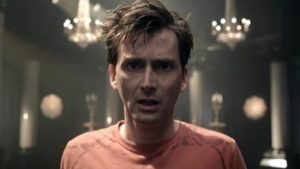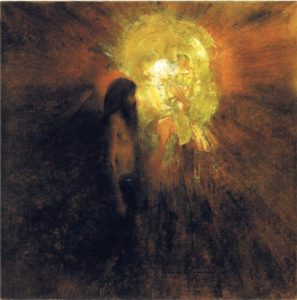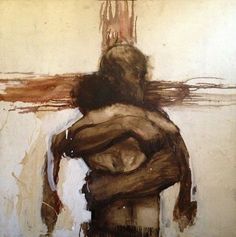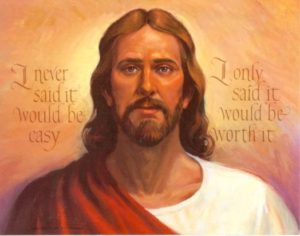
At Saint Peter’s, where I serve as priest and vicar, we have been taking a ‘Long Look at Luke’ over 2018. Over the last few weeks we’ve been journeying through chapters 11-14 which contains some of Jesus’ more divisive statements and parables. As I have returned to preaching and leading even I, who selected the specific passages, have struggled to know what to say or how to understand the character of God within them. The end of chapter 11 begins with Jesus dismissing and seemingly excluding the Pharisees and scribes from God’s Kingdom due to their hypocrisy. Chapter 12 contains the image of a master cutting an unfaithful slave into pieces and beating most slaves either lightly or severely and Jesus concludes this image with the reality that he has not come to bring peace but division. Chapter 13 presents Jesus teaching that not all will be saved as some will be left outside the Kingdom banquet; an image that is repeated in chapter 14.
I have been reflecting, therefore, over the last few weeks, on the nature of God’s inclusion. I have been challenged afresh to revisit the prominent message of the Church at this time in history in the UK/West of ‘radical inclusion’; what do we mean by ‘inclusion’ and how do we legitimately interpret Jesus’ own depiction of exclusion of some from God’s Kingdom? Not all will be saved and therefore there will be, as Matthew’s gospel famously and powerfully depicts, a division of sheep and goats. It is right, therefore, to ask the common question of Jesus’ own time,
How then can we be saved?
When I hear the popular message of progressive brothers and sisters of ‘radical inclusion’ I am torn internally; one side celebrating the openness of God’s embrace and the other side with a multitude of questions. God, for me, clearly desires all to be saved. There is a clear, Divine plan of restoration of the whole of creation; a plan to redeem the brokenness that sin has inflicted on the world. That plan, however, requires each person to be transformed from the way of the world to the way of God’s Kingdom. The way of Jesus is not natural, otherwise we’d be living it and there would be no need for an intervention of Jesus himself. The questions that arise for me, when hearing the message of ‘radical inclusion’ are ones around the nature of sin, the impact of sin and the narrow door through which we are meant to strive to enter God’s Kingdom.
In the political machinations surrounding the discussions in the Church of England on inclusion, mirroring uncomfortably the same debates in the secular realm, there are ideologies on both sides which are unreasonable. I want to present my concerns with both sides, highlighting the unreasonableness of them and the opportunity open to them. I am going to need to present crude extremes in order to keep this short and I justify my use of them by calling on Scripture as a model (Genesis 1-3, Matthew 25:31-46, Luke 12:41-48, et al.) There are times when we need to use strong images to help us discern the nuances within ourselves. Many of my regular readers will know that I stray towards one end of the spectrum but I will attempt, as best I can, to explore the other side.
On the one hand we have ‘progressives’. This two-dimensional caricature is profoundly open to all people from every walk of life being saved. They either fully embrace universalism (everyone is going to be saved whether they make any sort of confession of Jesus’ Lordship on earth or not) or at least walk along the boundary with it. The inclusion of God’s love has no conditions or stipulations; God loves a person just as they are and there is no requirements except to accept that God loves you. Grace is given to them and that is enough.
On the other hand there are the ‘conservatives’ who, crudely depicted, share the desire for God to call people into relationship with him but acknowledge that God does put some standard on his people which differentiates them from others. There is an emphasis on sanctification and ‘setting apart’ of God’s people from others. There is a chosen-ness of God’s people which implies a non-chosen-ness of others. Grace is offered to all but not all will respond to the rigours of that life; some are excluded from the Kingdom.
Both sides have an issue with definition of terms. It is the differences in definition that, as usual, causes problems. What do we mean by ‘grace’ and ‘sin’? What is ‘baptism’ for? What is the ‘Church’? What are we doing by ‘blessing’ something? What does it mean to be ‘holy’? What is the difference between God’s ‘love’ and human ‘love’, if there is any? In this reflection, for once, I see no benefit from clarifying terms or offering definitions because it betrays another issue we face: authority.
I define terms based on a system of authorities and the interplay between them. Others will define those terms differently or feel the necessity to re-define those terms because of different authorities. Debate revolves around semantics and, not wanting to place myself in the ‘progressive’ or ‘conservative’ camp, I do not feel it will be helpful to base my argument on them. It therefore leaves me with one option and that is to try, as best I can, to use the definitions as I see them being used by both sides when discussing that particular side.

Progressives
What I see as the unreasonableness of this position centres around the purpose of the incarnation. It seems strange to me that in direct response to the horrors of the 20th century and the seeming repeating of that history in the 21st century there has been a rise of a secular humanist ideal. Humanism emphasises the centrality, if not the sole authority, of human agency; human beings are free to do what they please being bound only by reason and empirical materialism, ie. what can be seen and experienced in material reality. Progressives have embraced this raising of the human person’s freedom to choose and blended it with the Christian understanding of God’s love and grace and have created a world-view that states that we are essentially good and we must accept ourselves as beloved of God as our very identity. The trouble with this is the agency of Christian believers participating and steering the horrors of history and particularly the 20th century. Progressives respond saying that they were not Christians and that they perpetrated those crimes under the name of Christ but Christ did not affirm the action. I agree that many horrific actions have been done in the name of Christ to which he will deny any part in. This philosophical move, however, creates exclusion within the world: there are some who are in Christ and there are others who are not (at least not fully). If all are made in the image of God and therefore all are good, their desires are naturally bent towards God then which actions are ‘good’ and which are ‘bad’. There becomes a schema of God’s people of those who understand God’s will and others who are confused. There are some who say they believe in Christ but betray themselves by acting contrary to a particular view of Christianity. If we are all made perfect in God’s image, and are ‘task’ is to allow that natural inclination towards the Divine to restore us then Jesus’ incarnation was purely a prophetic act of teaching and gentle correction. Jesus becomes a moral teacher directing us towards our natural propensity for goodness. Jesus’ death is not about some cosmic reordering or conquering of sin (penal substitution) but a prophetic act of how we should respond to violence. Penal substitution becomes the ‘cosmic child abuse’ as an angry God sends his innocent Son to die and heaps upon him all the pain and suffering without any help.
Under a banner of inclusion of all people, baptism becomes an unconditional welcome and affirmation of a person. What of God’s demand upon us to live a life worthy of his grace with particular teaching and instruction? In their definition of grace, a person needs to do nothing in order to work out their salvation. Salvation is the total redemption of person given to people freely by God, no questions asked. It is unreasonable, however, as it is based on this supposed tendency of all humans to be morally good and to know what is right and wrong instinctively. The particular type of humanism adopted by progressives suggests that all are reasonable and we are evolving towards good and that we can, if we try hard enough, and we fight for the right causes on the right side, we will discover God’s emerging and evolving plan for good. The problem is that we clearly don’t desire good. Our seemingly good intentions lead us to do the most terrible acts. No one sets out to be evil. The most terrible thing is to become aware that we are evil without even knowing it. Our desires and passions are not inherently, God-given. We are a mass of contradictions and there is a need for reforming and change.
 If you watch the Star Wars prequels and witness the development of the relationship between Anakin Skywalker and Padme you will witness how Anakin’s desires and passions seem to be good. He loves Padme, they are meant to be together, it is destiny. The advice of the Jedi Masters is to resist and control those feelings that the love will ultimately destroy them (and the very democracy they are supposedly fighting for). Many challenge the Church’s ‘restrictions’ and ‘rules’ the very way that Anakin questions the Jedis. Obedience to an institution is alien to the humanist ideal and suddenly the Church becomes a place of oppression and control. A duality emerges between the human freedom and the social/political body of which the body must embrace the individual or be destroyed. What was it that led Anakin to the dark side? What are being asked to learn from his journey? How did Obi Wan Kenobi, Yoda and others try to advise and teach young Skywalker?
If you watch the Star Wars prequels and witness the development of the relationship between Anakin Skywalker and Padme you will witness how Anakin’s desires and passions seem to be good. He loves Padme, they are meant to be together, it is destiny. The advice of the Jedi Masters is to resist and control those feelings that the love will ultimately destroy them (and the very democracy they are supposedly fighting for). Many challenge the Church’s ‘restrictions’ and ‘rules’ the very way that Anakin questions the Jedis. Obedience to an institution is alien to the humanist ideal and suddenly the Church becomes a place of oppression and control. A duality emerges between the human freedom and the social/political body of which the body must embrace the individual or be destroyed. What was it that led Anakin to the dark side? What are being asked to learn from his journey? How did Obi Wan Kenobi, Yoda and others try to advise and teach young Skywalker?
The progressives, however, rightly remind us of the radical love of God who deems all worthy of invitation. Nothing is to big for him to embrace. There is no limitation on what he would do for each of us. The Church has always been most impactful amongst the poor and outcasts and Jesus’ heart was to relate with those who are starved of acceptance and love. History has shown that ‘Christians’, once in positions of power in society have cowed to Political pressure to mirror the exclusions of the world. We have participated and driven terribly oppressive social decisions and actions and committed grievous suffering on others in the name of self-promotion and defence. The Church is not immune to corruption and collusion with ‘evil’ and we must be wary of sleep-walking into such states. The progressive demand we ask questions of where our heart is and to wake up to the battle that rages around us demanding us to respond as Christ.
Conservatives
The unreasonableness of the conservative position revolves around the notion of ‘grace’. It is true that Jesus saves his most damning words for the hypocritical religious leaders. The mix of political power and religion is clearly one of the most potent destructive force in the world. Power is about control, expressed primarily in rules and regulations. The legal framework that holds bodies of people together is often where abuse begins. The Church has fallen repeatedly, throughout history, for this very deception and trap. It has caused division after division and we should never rest from grasping this truth and dealing with it. We must humble ourselves to hear Christ’s warnings and woes to the Pharisees, scribes and religious leaders around hypocrisy and to often conservatives refuse to allow those challenges to be sown deep within them. It is true that Jesus is clear as to his own moral code and ethic but he handles it with a forgiving grace which does not condemn but does discipline. Too often the conservatives are selective about the weight of different expressions of sin. In their attempt at guarding and teaching perceived truths of the tradition, to not be swayed by the world and temptation to fall away, they ignore the revolutionary message of Jesus to the same mindset in 1st century Judea. In rightly dealing with the speck in their brother or sister’s eye they happily allow the plank in their own eye to remain (maybe to be dealt with tomorrow or at some point…). In the many exclusive claims Jesus makes as to who will be part of God’s Kingdom and who is not, the vast majority of those excluded are the hypocritical Jews of political power. The irony is that in embracing a protestant understanding of grace, those of a conservative bent deny salvation by faith with the post grace works of behavioural rules and dogmatic teaching. The movement of ‘works’ is from pre salvation to post salvation. God doesn’t demand anything upfront only to land all the burden afterwards.
Under the banner of holiness of God’s people, baptism becomes selective to those who can articulate enough understanding of the truth of God’s salvation. What of God’s grace that can work with even the smallest seed of faith? Grace becomes conditional on change of behaviour and life. Our own human lack of capability of holding the tension of difference and breakdown of relationships covers grace and forgiveness. We jump too quickly to the tidiness of sanctification and holiness and individuals become necessary collateral for the perfecting people of God.
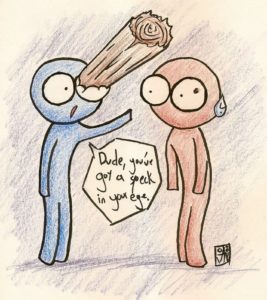 Again, in Star Wars, the failure of the Jedis to pastor Anakin through his doubts and mistakes was in their lack of transparency and honesty. It was seemingly more important to protect the Jedi Order than to love and invest in Anakin. Anakin became collateral in the bigger, cosmic battle going on. It seemed to Anakin that he was being used, manipulated and ignored and trust was not built enough to hold him and engage him. The admittance of difficulty, confusion and fear is a vulnerable but necessary part of building trust between people. The conservatives have not shown enough awareness of the pain of their own sin and mistakes. Confession and lament over our part in the causes of suffering is sadly lacking in the Church and this does great damage to the message of forgiveness and grace that is so clearly taught, in theory, in conservative circles.
Again, in Star Wars, the failure of the Jedis to pastor Anakin through his doubts and mistakes was in their lack of transparency and honesty. It was seemingly more important to protect the Jedi Order than to love and invest in Anakin. Anakin became collateral in the bigger, cosmic battle going on. It seemed to Anakin that he was being used, manipulated and ignored and trust was not built enough to hold him and engage him. The admittance of difficulty, confusion and fear is a vulnerable but necessary part of building trust between people. The conservatives have not shown enough awareness of the pain of their own sin and mistakes. Confession and lament over our part in the causes of suffering is sadly lacking in the Church and this does great damage to the message of forgiveness and grace that is so clearly taught, in theory, in conservative circles.
The conservatives are right to resist social change for the sake of being acceptable to those currently outside of the Church. As part of our current missional imperative we are having to deny the discipleship imperative of the clearly necessary transformation and demands that following Jesus require. In our ‘openness’ we are re-defining out of existence a moral code and ethic laid down in Scripture. Conservatives are right to uphold the Scripture, the Tradition of interpretation and the process of corporate discernment by Reason in opposition to individual discernment and interpretation. Unity depends upon a shared sense of authority to correct our wayward desires and lack of understanding and our culture has surely proven itself incapable of maintaining peace and unity as it seeks to individualise the discernment process and sown subjective relativism into public discourse. The conservatives demand we ask questions of the competing narratives in our world and to make clearly distinctions as to where each path leads to in the end.
Inclusion/Exclusion
So where does this lead me to the nature of God’s inclusion?
I have currently landed on the view that God clearly invites all to be in relationship with him, to receive his love and embrace. This invitation is not based on anything we have done, said or achieved but freely because of his generosity towards us. The invitation is to be in relationship with him, to know the peace of redemption and the power of resurrection that counteracts and transforms death into eternal life. This invitation has instructions attached to it as to how you accept and enjoy the party; instructions that if not followed means you will not be admitted to the party despite you holding an invitation. In this way God does not pre-empt inclusion with exclusivity but rather we, in our natural inclinations and sin exclude ourselves. When we turn up to a swimming party without the appropriate swimming costume you will not be allowed into the swimming pool and will not fully participate in the party. This does not change God’s desire for you to be included but you have chosen to ignore the instructions. God will do all that is possible to rectify that mistake or failure but it requires you acknowledge you made a mistake.
What I hear progressives saying is there are no stipulations or instructions on the invitation. People without swimming costumes get in the pool and make the pool dirty so no one can enjoy the party.
What I hear conservatives saying is that if you are not clear as to what the stipulations or instructions say then you are clearly not invited. People must come wearing the same swimming costume, have washed thoroughly, must know all the rules of the pool before getting in otherwise you will be shamed and thrown out.
We can feel as though we are being excluded because of who we are and we feel the sting of rejection profoundly. We are never good at identifying and taking responsibility in the role we play in our own exclusion. There are many parts of ourselves that technically exclude us from the party and we must be attentive to those and request help from God who, in his grace, promises to do so. The truth is that both the speck and the plank must be removed from the eyes. Anakin felt excluded from the Jedi Order; he was not welcome. This, however, was his pride and arrogance. He held a morally superior position and this contaminated his mind from accepting the necessary correction and teaching of others. The Jedi Order struggled to include Anakin in their life because he was complicated and messy and resisted the change and was a risk.
Ultimately, I do not see how the Church of England, or the global, universal Church, will maintain peace and unity whilst there is so much unresolved anger, pain and confusion. What is required, I believe, is an honest and frank admittance from both sides of sin. Sin being the natural inclination to protect one’s self from pain, trauma and suffering by either fighting a perceive external cause or running away from conflict/ignoring the painful conflict within us. Sin is the selfishness that distorts the other to maintain our misguided vision of the world. Both progressives and conservatives are victims to this and both are tearing the galaxy apart. If we are to learn anything from the Star Wars Saga (upto Return of the Jedi) is that all teeter on the edge of darkness and it requires a constant humility and watchfulness to ensure we control our desires and not our desires to control us.

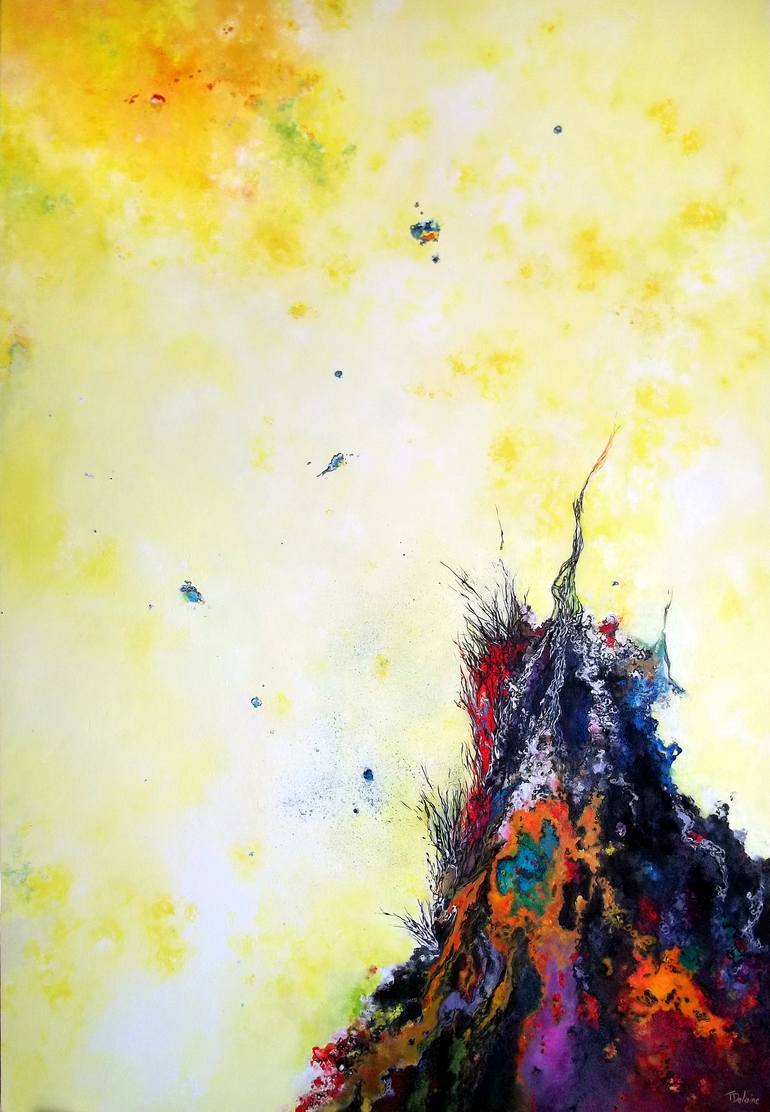


 If you watch the Star Wars prequels and witness the development of the relationship between Anakin Skywalker and Padme you will witness how Anakin’s desires and passions seem to be good. He loves Padme, they are meant to be together, it is destiny. The advice of the Jedi Masters is to resist and control those feelings that the love will ultimately destroy them (and the very democracy they are supposedly fighting for). Many challenge the Church’s ‘restrictions’ and ‘rules’ the very way that Anakin questions the Jedis. Obedience to an institution is alien to the humanist ideal and suddenly the Church becomes a place of oppression and control. A duality emerges between the human freedom and the social/political body of which the body must embrace the individual or be destroyed. What was it that led Anakin to the dark side? What are being asked to learn from his journey? How did Obi Wan Kenobi, Yoda and others try to advise and teach young Skywalker?
If you watch the Star Wars prequels and witness the development of the relationship between Anakin Skywalker and Padme you will witness how Anakin’s desires and passions seem to be good. He loves Padme, they are meant to be together, it is destiny. The advice of the Jedi Masters is to resist and control those feelings that the love will ultimately destroy them (and the very democracy they are supposedly fighting for). Many challenge the Church’s ‘restrictions’ and ‘rules’ the very way that Anakin questions the Jedis. Obedience to an institution is alien to the humanist ideal and suddenly the Church becomes a place of oppression and control. A duality emerges between the human freedom and the social/political body of which the body must embrace the individual or be destroyed. What was it that led Anakin to the dark side? What are being asked to learn from his journey? How did Obi Wan Kenobi, Yoda and others try to advise and teach young Skywalker? Again, in Star Wars, the failure of the Jedis to pastor Anakin through his doubts and mistakes was in their lack of transparency and honesty. It was seemingly more important to protect the Jedi Order than to love and invest in Anakin. Anakin became collateral in the bigger, cosmic battle going on. It seemed to Anakin that he was being used, manipulated and ignored and trust was not built enough to hold him and engage him. The admittance of difficulty, confusion and fear is a vulnerable but necessary part of building trust between people. The conservatives have not shown enough awareness of the pain of their own sin and mistakes. Confession and lament over our part in the causes of suffering is sadly lacking in the Church and this does great damage to the message of forgiveness and grace that is so clearly taught, in theory, in conservative circles.
Again, in Star Wars, the failure of the Jedis to pastor Anakin through his doubts and mistakes was in their lack of transparency and honesty. It was seemingly more important to protect the Jedi Order than to love and invest in Anakin. Anakin became collateral in the bigger, cosmic battle going on. It seemed to Anakin that he was being used, manipulated and ignored and trust was not built enough to hold him and engage him. The admittance of difficulty, confusion and fear is a vulnerable but necessary part of building trust between people. The conservatives have not shown enough awareness of the pain of their own sin and mistakes. Confession and lament over our part in the causes of suffering is sadly lacking in the Church and this does great damage to the message of forgiveness and grace that is so clearly taught, in theory, in conservative circles.

